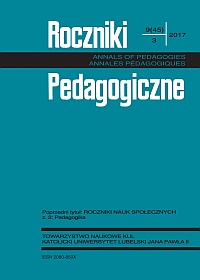The Same Old Seminar in a New Written Format
Main Article Content
Abstract
Studies in various professional domains have found that university graduates lack sufficient ‘soft’ professional knowledge and skills such as oral and written competencies. This current action research explores the process and outcomes of teaching preschool student teachers a new writing genre. Within a controlled design, 46 senior undergraduate students in an Israeli teachers’ college attended two similar annual seminars conducted by the author. Ten of them volunteered for the experimental group who wrote their research project in the format of a professional article. That format was a relatively short text written in simple jargon-free language, in contrast to the type of articles appearing in peer-reviewed academic journals. The control group (N=36) wrote A seminar paper according to the conventions of academic writing. Comparing students’ perceived academic writing skills within subjects and between groups, before and after the program showed no significant differences. The students’ open qualitative reflections vividly describe the problems they faced at the beginning of the course and the satisfaction they shared at the end. The discussion addresses these unexpected outcomes, criticizes the reliance on one conservative writing genre, and emphasizes the importance of teaching other up to date and more relevant genres that meet current professional demands.
Article Details
References
Breeze, R. (2012). Rethinking Academic Writing Pedagogy for The European University. Amsterdam: Brill Academic Publishers, eBook.
Butin, D. (2006). The limits of service-learning in higher education. The Review of Higher Education, 29 (4), 473-498.
Cappelli, P. (2015). Skill gaps, skill shortages, and skill mismatches: Evidence and arguments for the United States. ILR Review, 68 (2), 251-90.
Cheol, S.J., & Teichler, U. (eds.) (2013). The Future of the Post-Massified University at the Crossroads: Restructuring Systems and Functions (Vol. 1). New York: Springer Science & Business Media.
Dysthe, O. (2002). Professors as mediators of academic text cultures: An interview study with advisors and master’s degree students in three disciplines in a Norwegian university. Written Communication, 19 (4), 493-544.
Ellis, R.A., Taylor, C.E., & Drury, H. (2005). Evaluating writing instruction through an investigation of students’ experiences of learning through writing. Instructional Science, (33), 49-71.
Ferrance, E. (2000). Action research. LAB, Northeast and Island Regional Education Laboratory at Brown University.
Firsteter, E. (September 2015). Someone to speak with. Hed Hagan, 80 (1), 56-63.
Flesch, R. (1948). A new readability yardstick. Journal of Applied Psychology, (32), 221-223.
Greene, S. (1993). The role of task in the development of academic thinking through reading and writing in a college history course. Research in the Teaching of English, 27 (1), 46-75.
Hartley, J. (2008). Academic Writing and Publishing. London: Routledge.
Hartley, J., Sotto, E., & Fox, C. (2004). Clarity across the disciplines: An analysis of texts in the sciences, social sciences and arts and humanities. Science Communication, 26 (2), 188-210.
Jackson, D., & Chapman, E. (2012). Non-technical skill gaps in Australian business graduates. Education + Training, 54 (2-3), 95-113.
Jackson, K., Lower, C., & Rudman, W. (2016). The crossroads between workforce and education. Perspectives in Health Information Management, 5 (1), 1-11.
Kavanagh, M. H., & Drennan, L. (2008). What skills and attributes does an accounting graduate need? Evidence from student perceptions and employer expectations. Accounting & Finance, 48 (2), 279-300.
Kolb, A., Kolb, D. (2005). Learning styles and learning spaces: Enhancing experiential learning in higher education. Academy of Management Learning & Education, 4 (2), 193-212.
Luey, B. (2002). Handbook for Academic Authors (fourth ed.). Cambridge: Cambridge University Press.
Lumpkin, A. (2015). Enhancing undergraduate students’ research and writing. International Journal of Teaching and Learning in Higher Education, 27 (1), 130-142.
Manykia, J., Chui, M., Brown, B., Bughin, J., Dobbs, R., Roxburgh, C., and Hung-Beyers, A. (2011). Big Data: The Next Frontier for Innovation, Competition, and Productivity. McKinsey Global Institute. Available at http://www.mckinsey.com/insights/ business_technology/big_data_the_next_frontier_for_ innovation.
National union of Israeli students (August 2016). The committee for renovating the Israeli higher educational system: A report and recommendations. http://www.nuis. co.il/wp-content/uploads/2016/08/DOH-VAADA.pdf
Nygaard, L.P. (2009). Writing for Scholars: A Practical Guide to Making Sense and Being Heard. Copenhagen, DK: Copenhagen Business School Press.
Strongman, L. (2013). Academic Writing. Newcastle upon Tyne: Cambridge Scholars Publishing. eBook.
Vygotsky, L.S. (1980). Mind in Society: The Development of Higher Psychological Processes. Harvard University Press.
Yariv, E. (29.7.2010). Modeling academic writing within a ‘master-class’ format, First International Conference on Academic Writing, The Mofet Institute, Tel Aviv, Israel.
Yu, S., Churyk, N.T. & Chang, A. (2013). Are students ready for their future accounting careers? Insights from observed perception gaps among employers, interns, and alumni. Global Perspectives on Accounting Education, 10 (2), 1-15.
